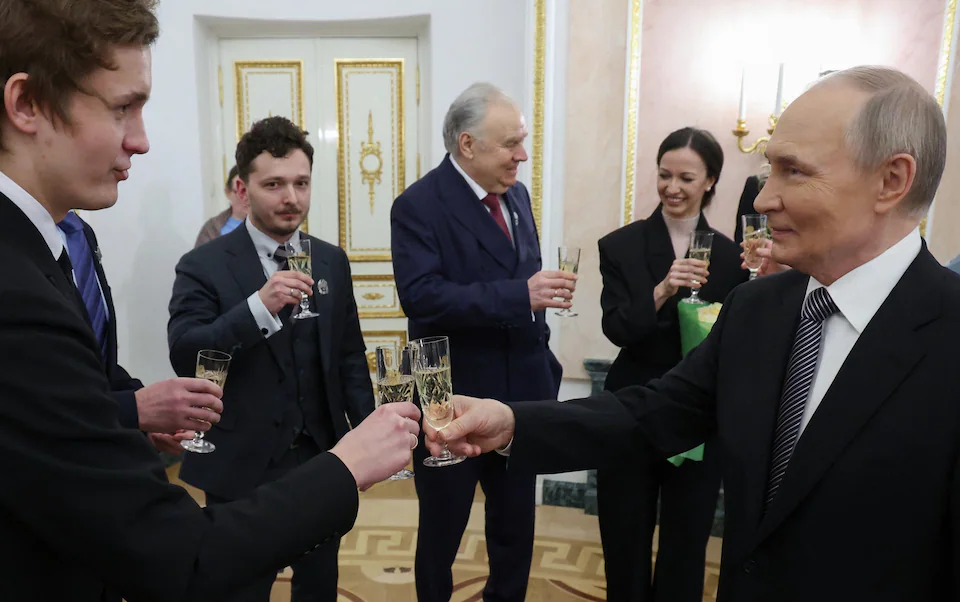Russia’s refusal to implement a ceasefire agreement with Ukraine in the Black Sea hinges on the lifting of international sanctions, a condition laid out by President Vladimir Putin following talks with the United States.
In a dramatic twist to the ongoing conflict, Moscow has insisted that sanctions on Russian agriculture, fertiliser exports, and financial institutions be lifted before it will commit to the maritime truce.
These demands were made clear shortly after the White House announced the tentative ceasefire deal, brokered after lengthy negotiations in Saudi Arabia.
The ceasefire proposal, which emerged from 12 hours of discussions between Russian and US officials on Monday, is aimed at securing safe passage for commercial vessels and preventing the use of military force in the Black Sea.
However, Moscow’s conditions have complicated the agreement, with the Kremlin stipulating that sanctions relief for Russian agricultural exports and financial institutions involved in the food trade be a precondition for implementation.
Sanctions a Sticking Point
Moscow has long argued that sanctions imposed after the invasion of Ukraine have crippled its economy, particularly in the agricultural sector, and continues to demand relief.
The White House has pledged to assist in seeking the lifting of these sanctions, especially those targeting Russian agriculture and fertiliser exports.
However, the lifting of sanctions is unlikely to be straightforward, and Washington and its allies remain divided on the issue.
The proposed agreement was expected to bring relief to global food markets, which have been severely disrupted by the ongoing conflict.
Russia’s demand to reintegrate into international banking systems, specifically the SWIFT payment network, is central to the deal, with Moscow pushing for the removal of restrictions on the Russian Agricultural Bank and other financial institutions involved in food exports.

Trump’s Role in the Negotiations
The ceasefire deal, while aimed at reducing hostilities in the Black Sea, is also entangled with broader geopolitical considerations. Shortly after the announcement, Moscow clarified that the deal would only be enacted once sanctions relief was confirmed.
The Trump administration, despite its support for the ceasefire, has faced increasing pressure to address these demands, as Russia seeks to link the Black Sea truce to a broader easing of international restrictions.
Ukraine’s President Volodymyr Zelensky, who had initially welcomed the deal, responded cautiously.
While agreeing that the truce would be beneficial, he stressed that it would only hold if Russian warships remained confined to the eastern part of the Black Sea. Any violation, he warned, would prompt Ukraine to call for further sanctions and military support from the West.
“We will treat any movement of Russian warships outside the eastern part of the Black Sea as a violation of the agreement,” Zelensky stated. “If that happens, I will demand more weapons and sanctions on Russia.”
Competing Interests and Regional Tensions
The negotiations have exposed deep divides between the US and Russia, with both sides accusing each other of dragging out talks for strategic gain. Moscow has been accused of using the negotiations to buy time and secure further territorial gains in Ukraine. A Kremlin source told the Moscow Times that Russia was “trying to make the most of the situation,” as it seeks to maximise territorial control.
The US, on the other hand, is pushing for an agreement that will restore safe shipping lanes and prevent further escalation in the Black Sea. However, Washington’s efforts to secure a joint statement with Moscow have faltered, underscoring the ongoing tensions between the two powers.

A Fragile Hope for Peace
Despite the setbacks, Zelensky expressed cautious optimism following the talks, emphasising Ukraine’s commitment to a peaceful resolution. “It is too early to say if this will work, but these were the right meetings, the right decisions, and the right steps,” he told reporters in Kyiv.
Yet, the situation remains fluid, with both sides continuing to make competing demands. If the sanctions relief conditions are met, the Black Sea deal could mark a significant step towards reducing tensions.
However, the prospect of a lasting truce remains uncertain, with analysts warning that the Kremlin’s demands for further territorial gains could undermine any long-term peace agreement.
Divided Views on the Black Sea Initiative
Nico Lange of the Center for European Policy Analysis argued that Russia has gained more from the ceasefire negotiations than it has given, noting that the country would receive a reprieve from sanctions and potential new income streams for its war effort.
“Russia gives almost nothing, but receives relief from sanctions, effectively bolstering its war machine,” Lange said.
The ongoing talks are likely to continue for the foreseeable future, with both sides keen to secure the most favourable terms possible. As Zelensky put it, “No one can accuse Ukraine of not moving towards sustainable peace after this.”
However, with Russia’s demand for sanction relief still unresolved, the path to lasting peace in the Black Sea remains fraught with challenges.



